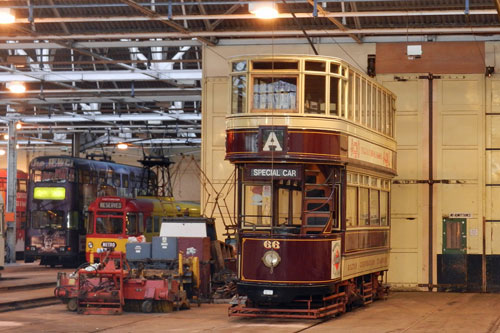|
|
|
| |
Page 1: An Overview 1933-2012
This page is under
construction!
All images link to larger
copies which will open in a new window/tab
|
|
|
This is one of a series of pages on Blackpool trams
under construction. This page presents an overview of Blackpool tram types
since deliveries of the streamlined fleet began in 1933. Some older vehicles
will also be added.
|
|
|
|
|
|
Page 1: An Overview 1934-2012
All images link to larger
copies which will open in a new window/tab
Blackpool Standard Car Car No.40
preserved at Crich Tramway Museum in 1976
Photo: ©1976 Ian Boyle
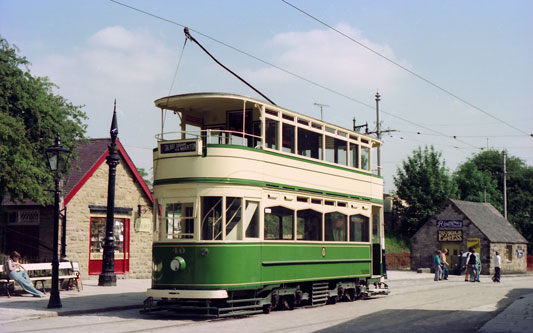
Railcoaches 200-224, 264-283 (later 608-620)
The first English Electric
trams in the streamlined fleet were the standard enclosed single deck trams
known as Railcoaches, so-called because they emulated the comfort of the
latest road coaches. 200 was the prototype English Electric streamlined tram
delivered in June 1933 and was 2ft shorter than later deliveries. The last
of the first batch, 224, was delivered in May 1934. Subsequent tram
deliveries to Blackpool were the Boats (225-236) and Balloons (237-263)
until February 1935. Deliveries of the second batch of Railcoaches (264-283)
followed, finishing in September 1935.
None of these trams remain in their original form. Most of the first batch
were scrapped between 1961-65. Ten cars were rebuilt as towing cars for the
Progress twin cars in the 1950s and 1960s and thirteen were converted to the
One-Man Operated (OMO) class in the 1970s. These have all since been
scrapped or withdrawn. The last railcoaches in the fleet were the heavily
modified former towing cars 678–680 which were converted back to single
trams with driver cabs at both ends. Two Railcoaches became illuminated cars
733 and 735. (Ref: Wikipedia)
Railcoaches in service
Photo: © Ian Boyle Collection
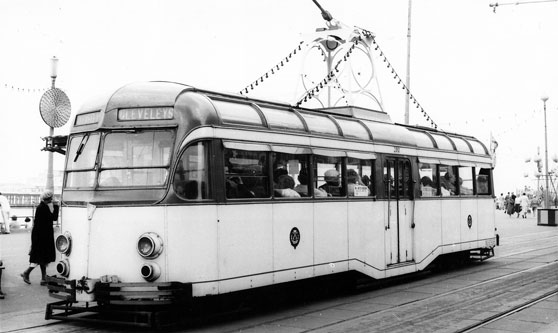
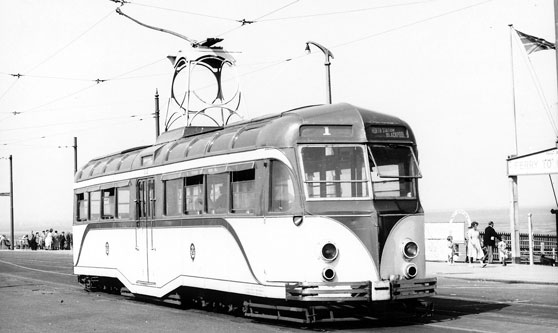
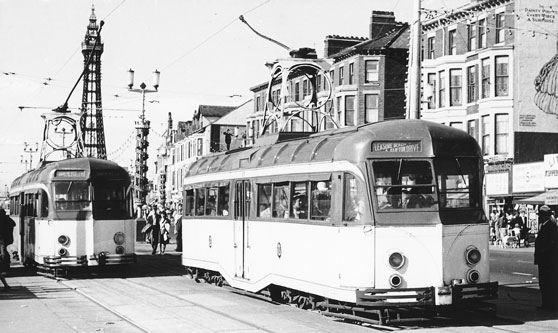
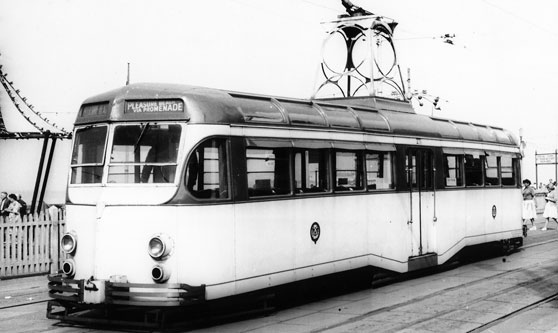
Boats 225-236 (later 601-607)
Built by English Electric in
1934, these cars are single deck open-topped models with central doors and
gangway. Twelve trams were built numbered 225-236 (later 600-607) and have a
passenger capacity of between 52 and 56. These cars are known as boats
due to their ship-like streamlined appearance and are one of the most iconic
Blackpool trams. All cars are virtually identical, except for 600, which has
shorter body panels.
The boats were first commissioned by Walter Luff in 1933, in accordance with
his five year plan. The first prototype boat arrived in Blackpool during
early spring in 1934 along with four other designs. After an initial trial
period, company directors approved an order for eleven more production cars,
which arrived in July and August 1934. These new boats were numbered
225-236.
Work began on the circular and coastal tours, replacing the original
toastrack cars, which were considered dangerous and old-fashioned. They were
stationed at both Rigby Road and Marton depots for ease of access and
continued there until the war years, when they were stored out of service
due to the withdrawal of the circular tour and general lack of demand. This
continued until 1946, when they returned to work on the promenade service.
The full twelve cars remained in regular service until the closure of the
inland routes during 1963. The fleet was reduced to eight cars and
renumbered 600-607, with 229, 231, 232 and 234 being mothballed and
eventually scrapped in 1968. In the early 1990s the boats were refurbished
and received a number of new liveries, including Routemaster red, blue and
yellow as well as a fictitious wartime livery.[ The fleet was converted from
trolley pole to pantograph conductors. However, they were soon converted
back, as passengers regularly complained at being showered by grease and
dirt from the power line when it rained.
In addition to the cars at Blackpool, there are boats currently serving in
the United States. Car 226 (601) has been at the Western Railway Museum,
Suisun City, California since 1971. Car 228 (603) was loaned to Philadelphia
in 1976 for the United States Bicentennial, and was then returned to
Blackpool where it was stored until 1984, when it was acquired as a gift for
the San Francisco Municipal Railway (MUNI) where it is still occasionally
operated. Finally, car 606 was given to the Trolleyville Museum, Ohio, in
September 2000, in return for Standard 147, which has been restored to
original condition. (Ref: Wikipedia)
Boat trams in service
Photo: ©1981/86 Ian Boyle
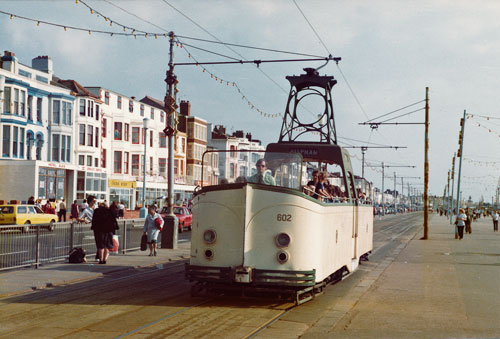
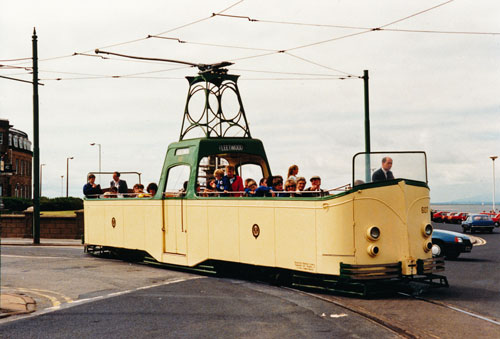
Balloons 237-263 (later 701-726)
Commissioned in 1933 by Walter
Luff, in a bid to modernise the tramway's fleet, they were intended to
replace the Dreadnought cars that had been in service since the opening of
the tramway. They were built by English Electric during 1934 and 1935, the
first being presented to Blackpool on 10 December 1934. 27 were delivered,
of which thirteen were open-topped (237-249). The rest (250-263) were fully
enclosed used on both summer and winter services. They had central doors and
stairs, with a capacity of 84-94. Half-drop windows provided ventilation and
art deco curved glass lights provided electric lighting. The enclosed-top
trams had sliding roof windows and thermostatic-controlled radiators.
The closed top cars originally worked on the Squires Gate service, and it
was during this time that they became known as Balloon Cars because
of their rounded streamlined appearance. During World War II the need for
the open-top cars fell significantly and cars 237-249 had their tops
enclosed to look almost like 250-263. Also during this period the fleet was
painted in a dark green and cream livery in order to conserve paint and
time, as well as to reduce the chances of their being spotted from the air.
After the war years the Balloons were neglected slightly in place of the new
Coronation Cars, as they were considered old fashioned and too slow to load.
Blackpool Corporation soon changed its mind after experiencing the
temperamental nature of the Coronations and the Balloons began to make a
comeback in the late 1950s. In 1958 check rail was installed through to
Fleetwood and the Balloons increasingly began to appear on market-day
specials, as they were useful for moving the large crowds travelling north.
The Balloons continued to run their normal Squires Gate service until its
closure in 1961, and following this the entire class solely worked on the
promenade service.
In 1968 they were re-numbered to 700-726. Between 1979 and 1982, Balloon
cars 725 and 714 were totally rebuilt into two new Jubilee cars, 761 and
762. The reconstruction of 725 included moving the stairs to the end and
extending its body length. However, 762 retained a central door. During
1980, an accident at the Pleasure Beach loop caused 705 and 706 to be
withdrawn. 705 was scrapped and 706 was rebuilt as an open-topper, later
named Princess Alice. During the early 1990s a number of Balloons
that had been retired from service were heavily modernised, re-emerging with
flat ends and modern interiors known as Millennium cars.
In 2002 the Balloons were banned north of Thornton Gate due to the poor
condition of the track. Following heavy repair work the Balloons were
allowed back from 2005.
With the arrival of the Flexity 2 trams, some Balloon cars are being fitted
with widened doors and other modifications to enable them to run alongside
the new fleet. Some others are being preserved: the first to leave, number
249/712, is preserved static (but with the interior open to the public as it
was when withdrawn) in pre-war livery at the National Tramway Museum at
Crich. One is remaining in operational condition at Beamish Open Air Museum,
but as Sunderland 101 in a red and cream livery. (Ref: Wikipedia)
Balloon trams in service
Photo: ©1981/86 Ian Boyle
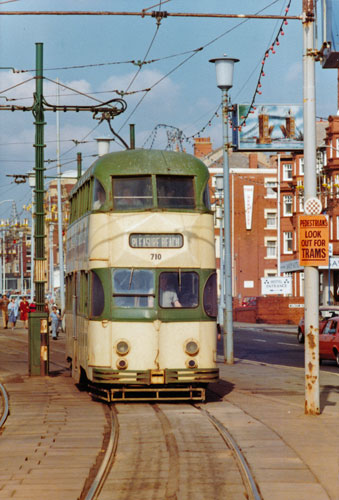
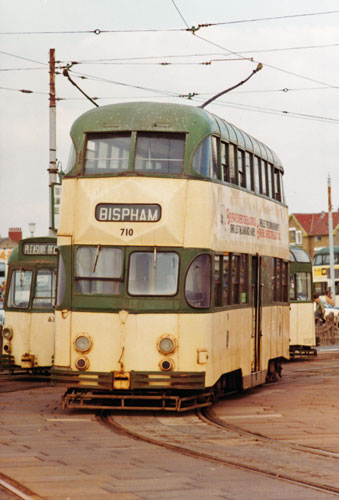
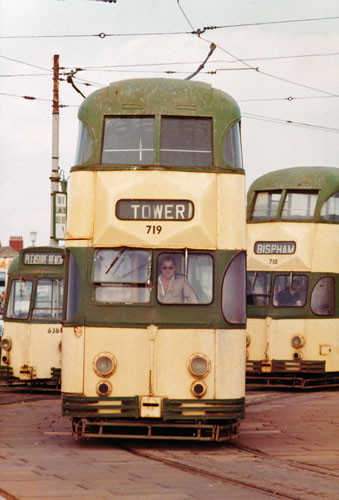
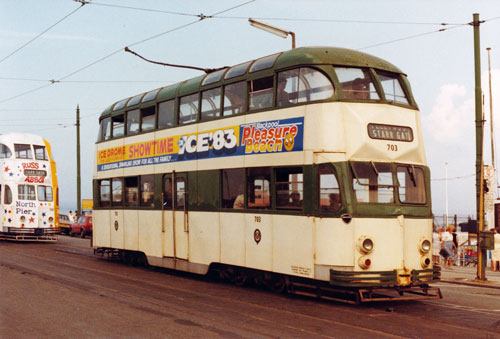
Balloon trams in service
Photo: ©1993 Ian Boyle
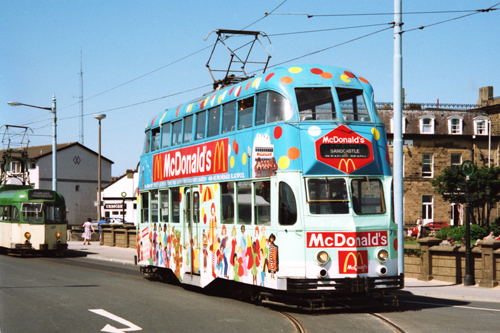
Balloon trams in service
Photo: ©1996 Ian Boyle
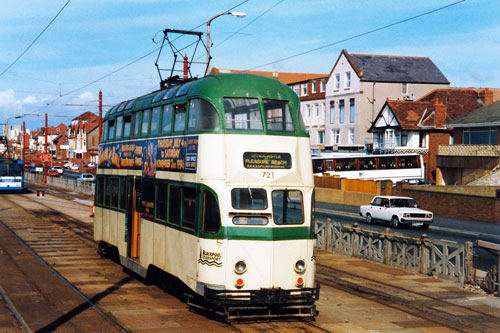
Brush Cars 225-236 (later 621-638)
In 1937, Brush built single
deck cars which closely resemble the original English Electric railcoaches.
They were numbered, later 621-638. Car 633 has been rebuilt into the
illuminated Trawler and is now number 737. The Brush cars originally had
twin front destination blinds and extra windows along the roof. These were
both removed on most examples and single destination boxes installed. Ugly
illuminated advertising boxes were also installed on many trams and most
also received full advertising liveries. (Ref: Wikipedia)
Brush cars in service
Photo: ©1979/86 Ian Boyle
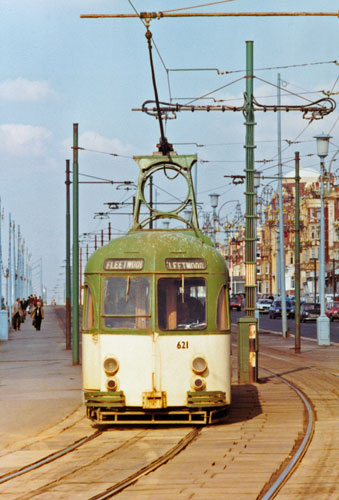
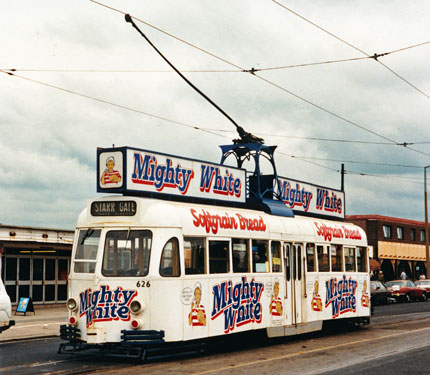
Brush cars in service
Photo: ©1993 Ian Boyle
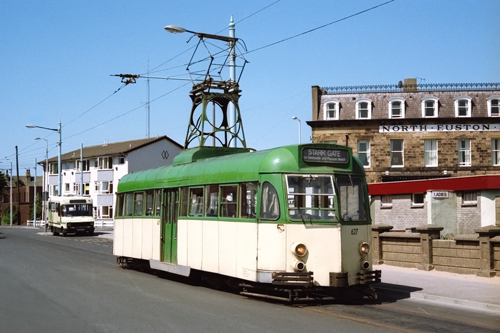
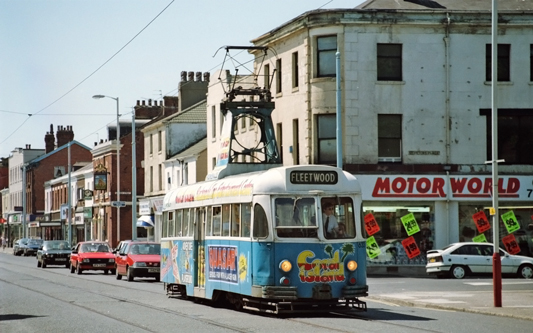
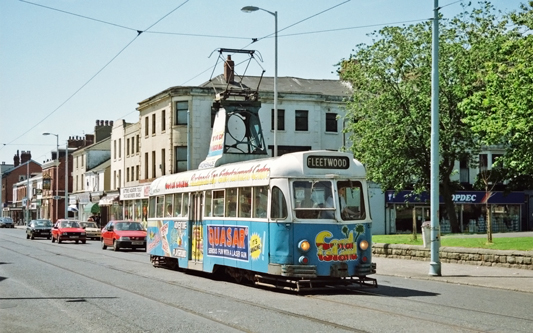
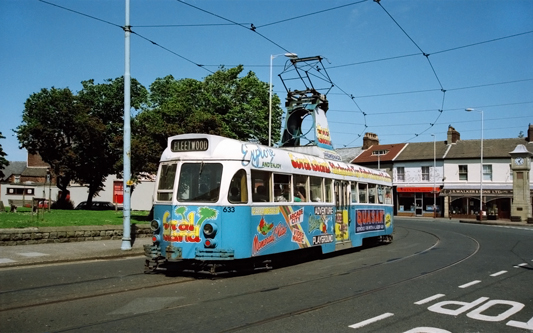
Named because they were
introduced in Queen Elizabeth II's Coronation Year, 1953 only three members
of this class of car remain. They were built by Charles Roberts Ltd at their
Horbury Junction works, nr. Wakefield. Two were preserved under the private
ownership of the Lancastrian Transport Trust (LTT). The sophisticated
Variable Automatic Multinotch Braking and Acceleration Control (VAMBAC)
control system of these vehicles proved to be their Achilles heel as it was
unreliable in service. Thirteen of the class had their VAMBAC systems
replaced by conventional controllers during the 1960s, prolonging their
comparatively short service life to 1975, when they were withdrawn. The
unmodified examples were withdrawn from service in 1968. (Ref:
Wikipedia)
Preserved Coronation
Photo: ©1986 Ian Boyle
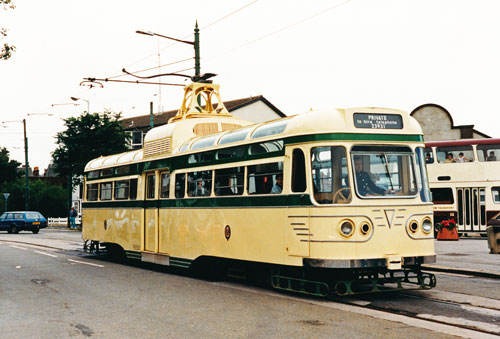
Progress Twin-Cars
(272-281 + T1-T10 - later 671-680 +
681-690)
Single deck towing and trailer
cars. 671–680 (towing cars) and 681–687 (trailer cars).
Ten English Electric Railcoaches from the second batch were rebuilt as
towing cars between 1958 and 1962. They were renumbered 272-281 (671–680
from 1968). Their cabs were heavily redesigned to resemble the then
contemporary Coronation cars. They towed ten new trailers (T1-T10) built by
Metropolitan-Cammell, which look almost identical except for the lack of a
pantograph tower. They were not a great success since they could only be
turned at return loops. 671-677 were later converted into fixed coupled
pairs with driving cabs fitted to the trailer so the set could be driven
from either end. The coupled trailers were renumbered 681-687. The other
three towing cars 678-680 continued to run as single cars and their trailers
were scrapped.
They operate in regular pairs, such as 675 and 685, except for 678 to 680,
which operate singly. The trailer cars originally had the fleet numbers
T1 to T10 (Ref: Wikipedia)
Progress Twin-Cars
Photo: ©1986 Ian Boyle
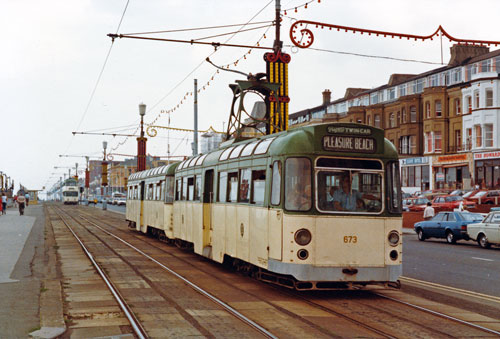
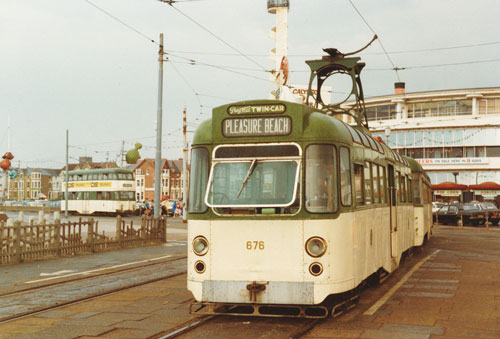
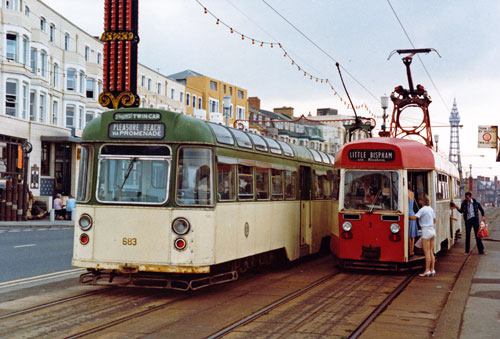
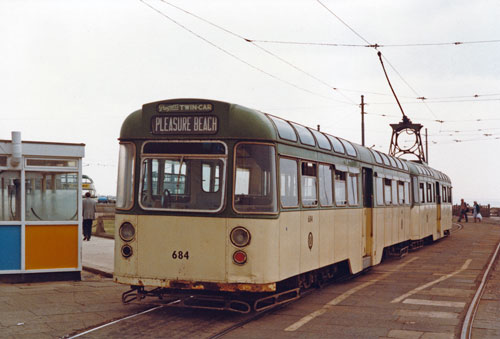
ex-Progress Twin-Cars running as
single cars
Photo: ©1993 Ian Boyle
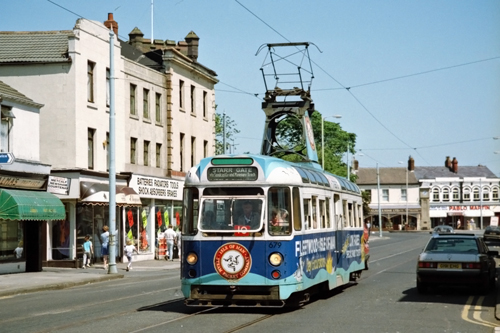
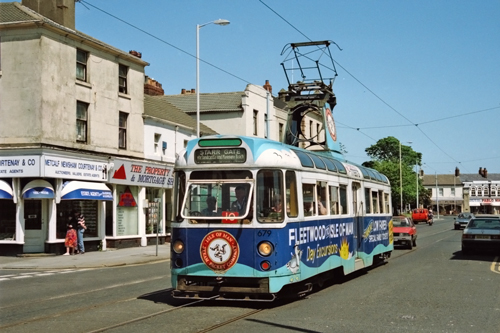
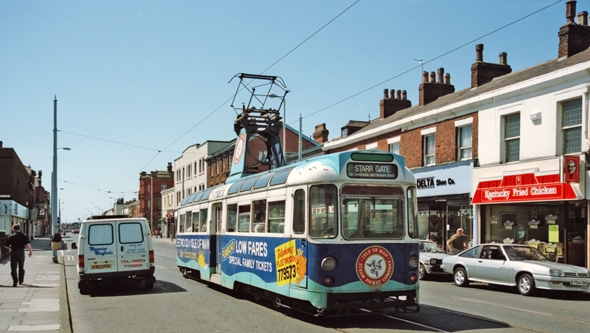
Between 1972 and 1976, thirteen
One Man Operation cars were rebuilt from Railcoaches. Simply known as 'OMO'
cars, these thirteen workhorses set about all-year service on the Starr Gate
- Fleetwood route. They were replaced from 1984 by the Centenary cars. Ten
of the thirteen cars were cars were scrapped, one was rebuilt whilst two are
in preservation today. (Ref: Wikipedia)
OMO cars in service
Photo: ©1981/86 Ian Boyle
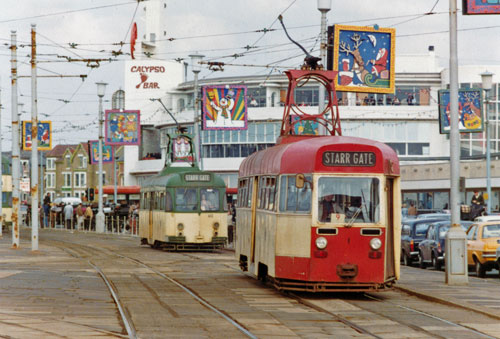
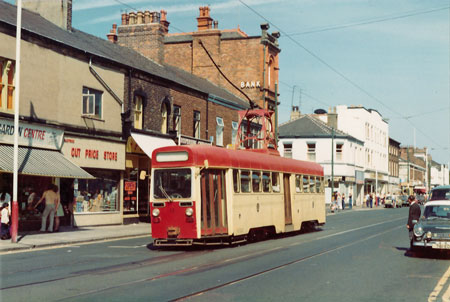
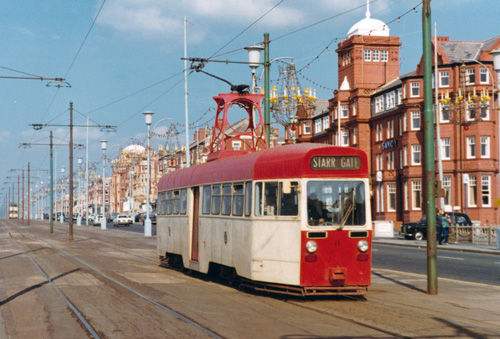
The In the late 1970s,
Blackpool Corporation decided that the tramway fleet needed modernising
after the closure of the inland routes during the 1960s. Attention was drawn
to two Balloon Cars, 714 and 725, which had been mothballed as they were in
need of an overhaul. It was felt that these would be useful on the promenade
during the summer due to their high seating capacity and reliability. The
corporation set about rebuilding one of these old Balloons into Jubilee
Cars. The first to be rebuilt, 725, was stripped down to its shell and
had its under-frame and body lengthened, controller changed, doors and
stairs relocated to the front and iconic pointed ends replaced with square
ones. The bogies were replaced with fabricated ones able to accommodate
Metalastik rubber/metal bonded suspension in the manner of the OMO vehicles
and the tram officially entered service in 1979 after testing as Jubilee
761. Balloon 714 was later rebuilt in a similar fashion, except it retained
its original central doors as well as the front ones in order to improve
passenger flow at stops. 714 re-entered service in 1982 as Jubilee 762.
(Ref: Wikipedia)
Jubilee cars in service
Photo: ©1983 Ian Boyle
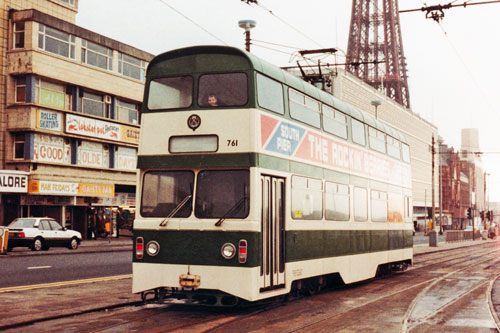
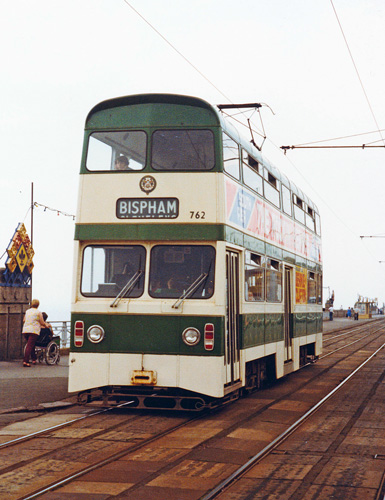
The centenary cars are single
deck trams with flat ends and doors positioned at both the front and centre
giving them a more bus-like appearance. They are numbered 641–648 and have a
capacity of 52 passengers (of which 16 is standing). They can be operated by
one person, as the position of the doors means that the tram can be solely
operated by the driver. This is useful during low season and early
morning/late night services.
Centenary cars were built by East Lancashire Coachbuilders in 1985, the
tramway's centenary year, hence their name. Originally intended to replace
the OMO cars which were suffering from metal fatigue, twelve were ordered.
However, due to cost cutting only eight were ever built. The cost cutting
continued as, although the bodies chassis and bogies were brand new the
motors and wheelsets were pre-war, refurbished from various withdrawn cars.
The bogie design continued the theme of the OMO cars, having "Metalastik"
rubber/metal bonded springs. (Ref: Wikipedia)
Centenary cars in service
Photos: ©1993 Ian Boyle
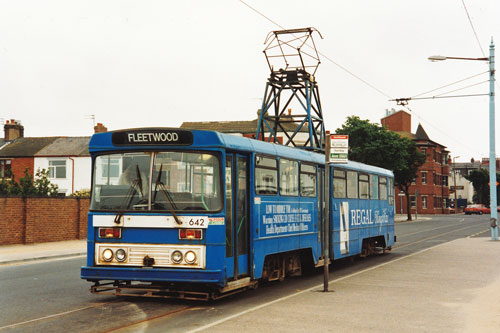
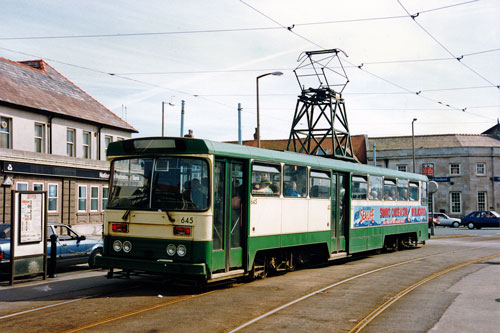
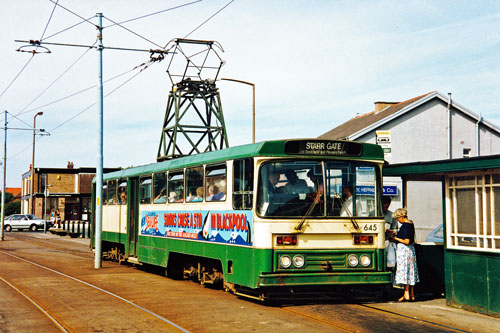
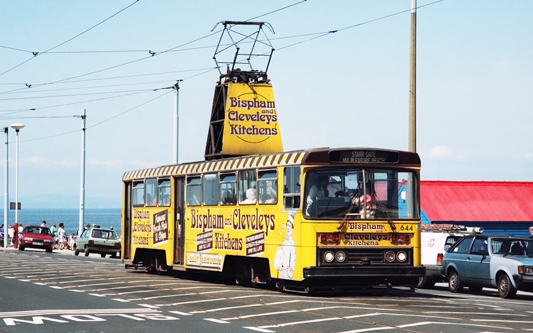
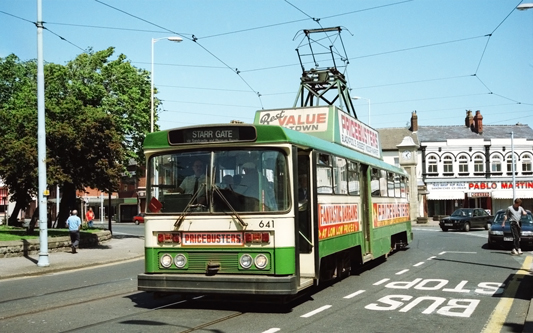
The Millennium cars are double
deck trams which were rebuilt from Balloon cars between 1998 and 2004 to an
in-house design. They have a much more rectangular shape which gives the
upper decks increased capacity. The trams retain the numbers they carried in
the Balloon series. The first conversion 707 lacked corner windows in the
upper deck, making it very gloomy and reducing visibility. Later conversions
had extra windows to match the driver's cab. 707 may have had these retro
fitted. (Ref: Wikipedia)
Millennium car 707
Photo: ©1998 Ian Boyle
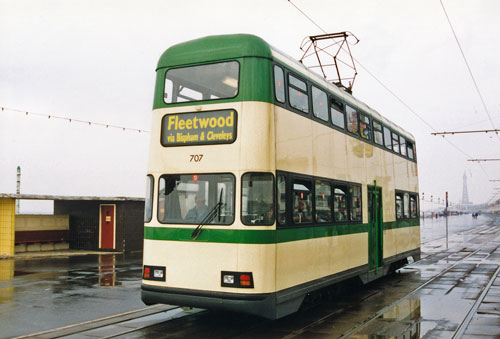
As part of the upgrade of the
entire tramway, 16 new Bombardier Flexity 2 trams were ordered, for use on
the tramway. The worldwide launch of the tram, including showing the first
new tram occurred on the 8th September 2011 at the new Starr Gate depot in
Blackpool. These state of the art trams include many differences to the
original fleet, including 100% step free access from platform to tram,
dedicated wheelchair spaces, and a higher seating and standing capacity, as
well as faster acceleration and quieter running. They are also fitted with
audio visual 'next stop' displays. The trams are accommodated at the new
depot built at Starr Gate by Volker Fitzpatrick. (Ref: Wikipedia)
More
Images of Flexity 2 trams
Flexity 2 cars in service
Photo: ©1979/86 Ian Boyle
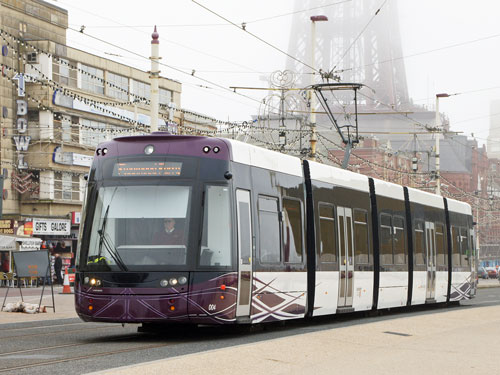
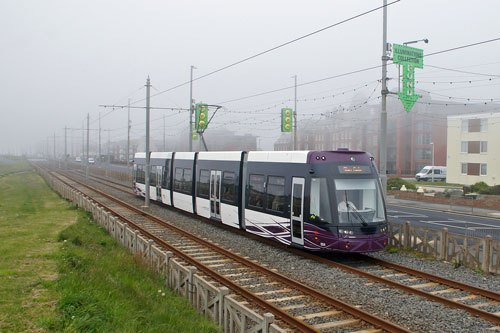
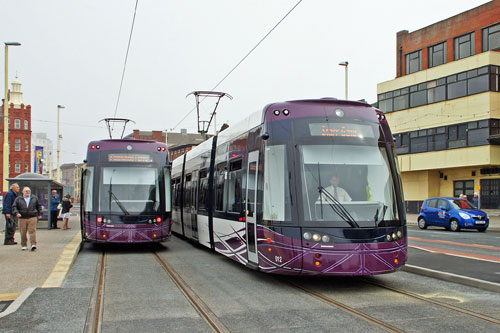
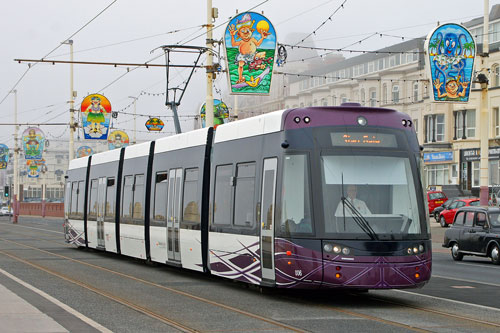
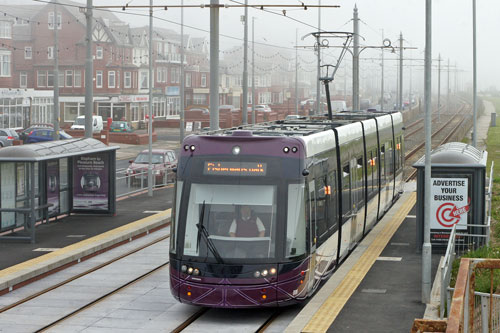
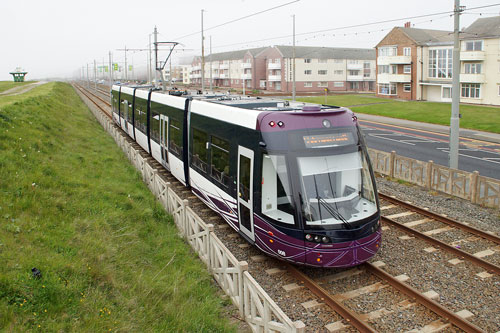
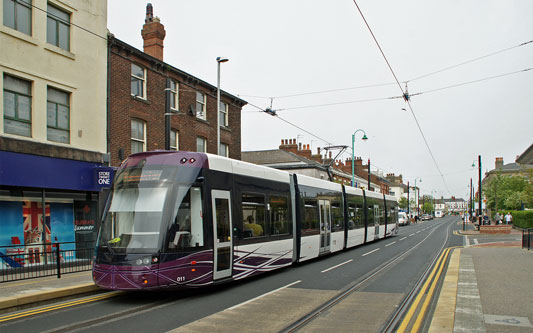
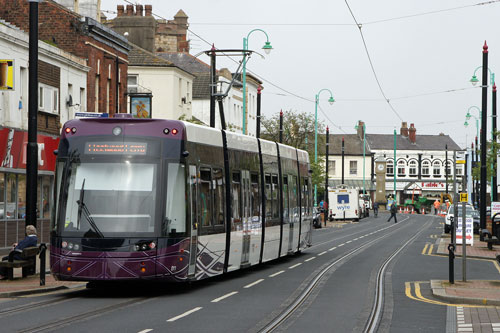
Western Train illuminated tram
leaving Rigby Road Depot
Photo: © Mike Tedstone 19th October 2012
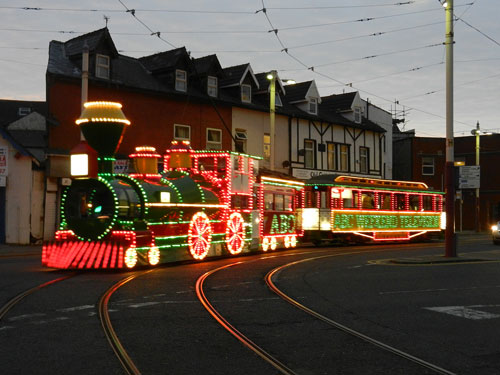
When I visited Blackpool in the
early 1980s, restored Bolton 66 was often used on normal services along the
Promenade, generally between Pleasure Beach and Little Bispham.
Bolton 66 at North Pier
Photo: ©1981 Ian Boyle
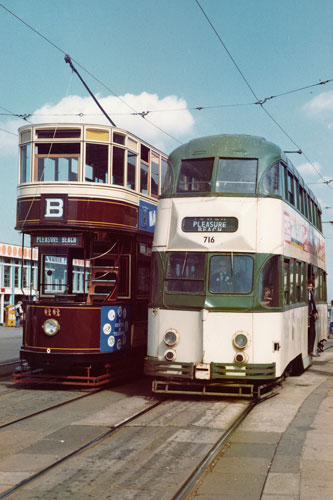
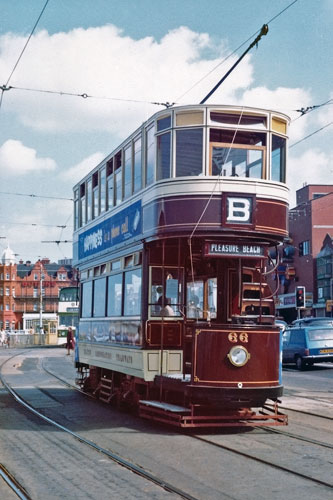
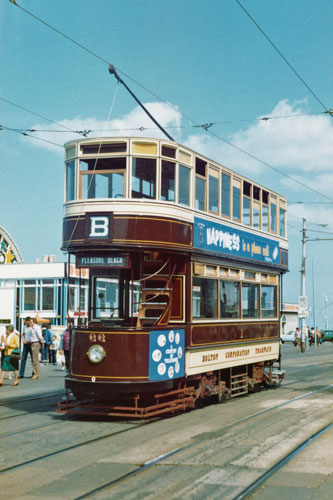
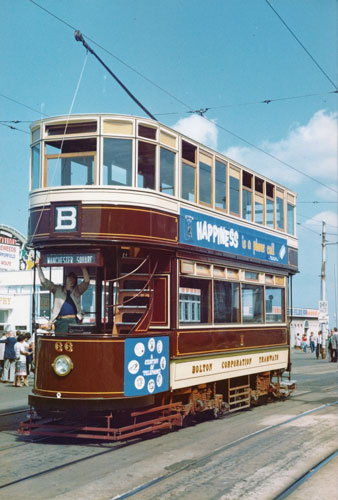
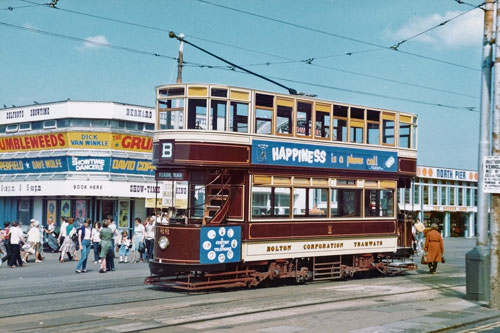
Bolton 66 at Pleasure Beach
Photo: ©1981 Ian Boyle
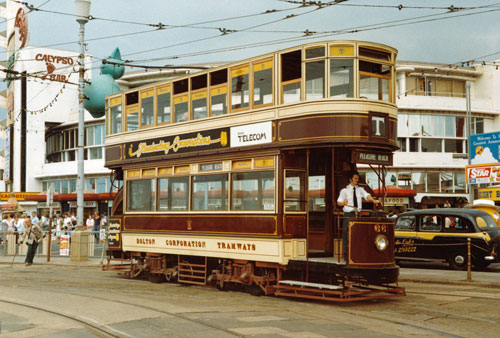
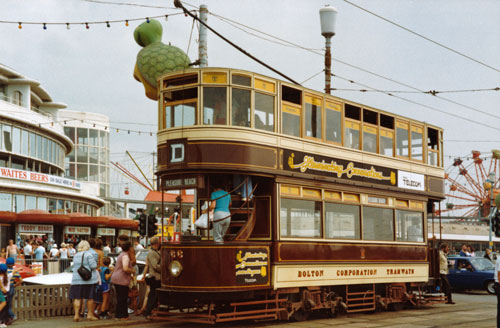
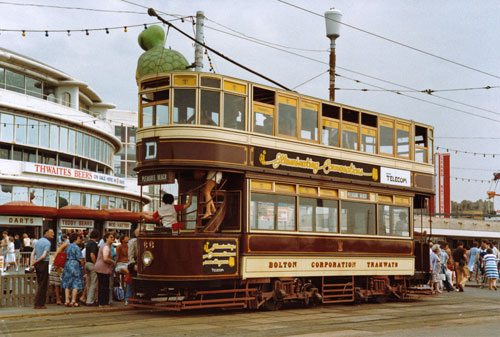
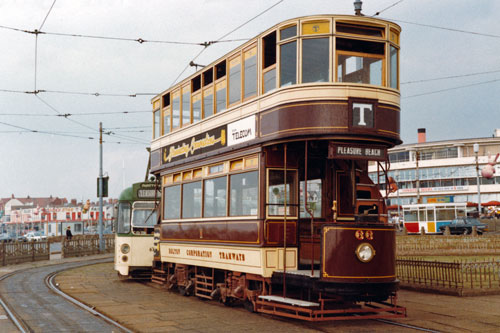
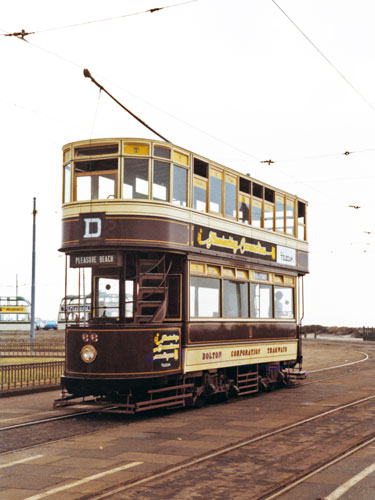
Bolton 66 remains at Blackpool
in 2012 - seen here in the depot
Photo: ©2012 Mike Tedstone
